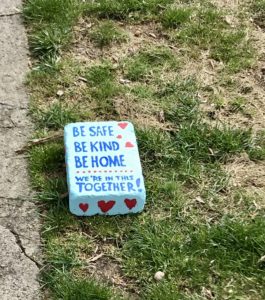 For the past several years I have been working on a book about caregiving and communities in relation to Victorian fiction. So it feels like I should have a lot to offer right now, particularly as I keep seeing statements in social media (or in media itself) about the heroism of caregivers. But for the first few weeks of the lockdown, I was feeling too stunned, too bludgeoned by the vastness of the change, to come up with any thoughts. And when I had thoughts, they were about the immense gap between lived experience and scholarly work on esoteric texts. Sometimes, however, I read something in the newspaper or on Twitter that bridged those modes. Sometimes an exhortation to reach out to others, or a praise of caregiving, or accounts of the writer’s yearning for community, resonated with the theories I had been reading and I recognized that behind what seemed like a tidal wave of inchoate personal need was, in fact, a structure. What looked like a feeling actually had the foursquare solidity of truth. There were things I knew. Those things granted a real framework to the way we lived now, and it occurred to me that I could share some of that information.
For the past several years I have been working on a book about caregiving and communities in relation to Victorian fiction. So it feels like I should have a lot to offer right now, particularly as I keep seeing statements in social media (or in media itself) about the heroism of caregivers. But for the first few weeks of the lockdown, I was feeling too stunned, too bludgeoned by the vastness of the change, to come up with any thoughts. And when I had thoughts, they were about the immense gap between lived experience and scholarly work on esoteric texts. Sometimes, however, I read something in the newspaper or on Twitter that bridged those modes. Sometimes an exhortation to reach out to others, or a praise of caregiving, or accounts of the writer’s yearning for community, resonated with the theories I had been reading and I recognized that behind what seemed like a tidal wave of inchoate personal need was, in fact, a structure. What looked like a feeling actually had the foursquare solidity of truth. There were things I knew. Those things granted a real framework to the way we lived now, and it occurred to me that I could share some of that information.
The following blog posts are short and somewhat impressionistic meditations. I’ve listed more scholarly sources at the end of each post for those who might want to follow up the issues.
Talia Schaffer, April 2020
Introductions to ethics of care:
Susan J. Brison, “Personal Identity and Relational Selves,” The Routledge Companion to Feminist Philosophy, ed. Ann Garry, Serene J. Khader, Alison Stone (NY: Routledge, 2017), 218-230
Jean Keller and Eva Feder Kittay, “Feminist Ethics of Care,” The Routledge Companion to Feminist Philosophy, ed. Ann Garry et al. (NY: Routledge, 2017)
Talia Schaffer, “Care Communities: Ethics, Fictions, Temporalities,” SAQ 118:3 (July, 2019): 521-542.

